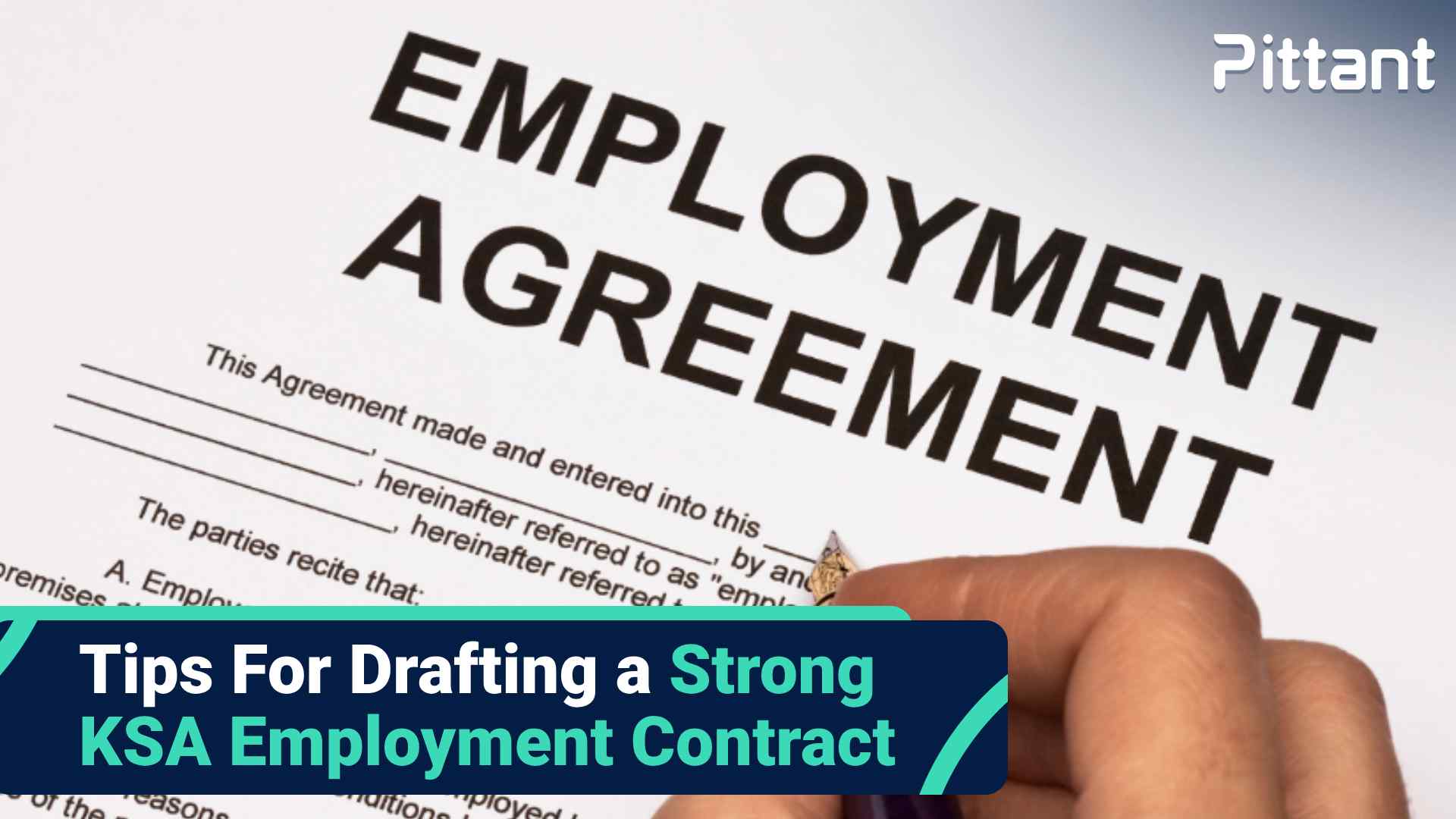An employment contract Saudi Arabia is a crucial issue for any individual or company that wants to start in the country. Specific labor laws and regulations may differ, and it is essential to understand the requirements of these documents. In addition, being able to follow best practices when drafting a solid and valid employment contract.
In this article, we are going to analyze the aspects that have to be considered when writing an employment contract Saudi Arabia. From duration and termination clauses to obligations and benefits. The idea is that you can still learn how to create a solid contract that protects both employers and employees in the Saudi Arabian employment context.
Salary, Advantages, and Perks Outlined in Saudi Arabia Employment Contracts

- General minimum wage: In Saudi Arabia, the national minimum wage is SR 4,000 for each working month.
- Payroll cycle: Currently, in Saudi Arabia, the frequency of payroll is usually weekly or maximum monthly. That is, the employer must make the payment to employees once a week, but employees with a monthly salary must have it at least once a month.
- 13th salary: It is important to note that the thirteenth-month payments are not mandatory. However, employers may pay bonuses depending on employees’ performance. But, this will depend on the employer, that is, at his discretion.
- Overtime: Among Saudi Arabia’s compensation laws is overtime pay of 100% of an employee’s normal hourly rate. However, an additional payment must be made as a 50% bonus. Finally, working on holidays is considered overtime.
Benefits management: Employers need to have an additional benefits scheme in an employment contract in Sathirteenth-months Arabia. Thus, they have the possibility of being able to attract better talents to vacant positions due to the good reputation that the company would have in the sector.
In essence, it is customary for employers in companies based in Saudi Arabia to provide employees with the following.
- Additional and complementary medical insurance.
- Plane tickets to return home on vacation.
- Bonuses in the form of money for educational expenses.
- Retirement plans.
- Mobile phones.
- Housing subsidies
- Transportation subsidies.
Finally, it is common to budget an additional 25% to the gross salary to be able to provide these benefits. Additionally, you have to describe each of these complementary benefits in the Saudi Arabia employment contract.
- Benefit Restrictions: The most important restriction to know when considering a Saudi Arabia benefits management plan is sick leave. Generally, employees can take up to four months of sick leave with a valid medical certificate.
Overtime Work
Any company that carries out its commercial operations or that wants to enter the kingdom has to have full knowledge corresponding to the labor laws of KSA.
The legal norm that is responsible for controlling employment in the kingdom can be relatively favorable for workers. That is why there are some important aspects, such as the regulation of working hours, termination of employment, and women’s jobs. The truth is that this tends to be very different from what is considered normal practice in other jurisdictions.
Initially, it is essential to know everything in terms of managing working hours and calculating overtime. Especially, with respect to meal and rest breaks according to the law. This is why it can be very useful to have attendance control devices in the company.
- General working hours: Currently, in Saudi Arabia the working week is usually 48 hours, that is, 8 hours a day, 5 days a week. However, a working day can be reduced to 6 hours a day, especially during the Ramadan period. This is with the exception of senior managers and officials, who are exempt from the relevant provisions.
In summary, an employee’s total work hours cannot be 10 hours per day or 60 hours in a six-day week. These maximum hours include overtime.
Every Friday is a day of rest for all workers. Additionally, there is an annual overtime limit of 481 hours.
- Overtime: Any work that is after standard weekly working hours must be paid as overtime. In addition, it has the regulations of an employment contract Saudi Arabia.
Upon consummation of the eighth hour of work, the worker has to get 150% of his salary.
Healthcare and Insurance Coverage for Employees
In Saudi Arabia, you can see or find a large population of foreigners, specifically, 30% of the total population. Particularly, the Saudi Social Insurance Organization (GOSI) provides the following benefits:
Saudi citizens:
- Compensation and work accidents and occupational risks.
- Temporarily disabled.
- Permanent disability or death.
- Unemployment insurance.
Foreign.
- Any foreigner can only benefit from compensation for accidents at work and occupational risk insurance.
The specific contributions are as follows.
- Saudi citizens (private and public sector): 22% of the applicable maximum monthly income, i.e. 9% each for the employee and the employer for one annuity. In addition, the following contributions are those that employers have to pay: 1% each for unemployment contributions, and 2% for occupational risks.
- Foreigners: 2% for occupational risks borne by the company’s employer.
It is important to note that GOSI does not cover medical treatment, except in cases of work accidents.
On the other hand, there are other complementary benefits for employees in the health area, that is:
- Health insurance: Health insurance must be acquire from private insurers in the Saudi Arabia, as it is obligatory.
Health insurance must be offered by all employers to both foreigners and Saudi citizens. In addition to taking into account families and dependents without any limitation on number.
The Health Insurance Council or CHI is answerable for regulating the compulsory health insurance plan. If you have employers who do not provide health insurance to employees and families, sanctions and fines will be enforced.
- Death and disability: Generally, 8% of employers provide death and disability benefits. However, awareness of these types of benefits increases year after year.
- Pension: Private pension plans are currently in the initial phases, that is, they have yet to be developed.
Maternity and Family Health Benefits
- Maternity leave: Any employee has the possibility of 10 weeks of paid maternity leave. Specifically, from four weeks before the expected delivery date. Additionally, it is not potential to work during the 6 weeks immediately after giving birth.
Payment for maternity leave is the obligation of the employer, and must be at a rate that rely on the employee’s seniority. In addition, employees with at least 1 year of service can enjoy 50% compensation. Employees who have served for at least 3 years qualify for 100% compensation at their regular salary.
On the other hand, employees with access to full salary during maternity leave cannot also enjoy annual leave pay that same year. However, employees who have 50% salary can also take half of their paid annual leave in the same year.
- Paternity leave: The father or partner can enjoy paid paternity leave. Specifically, after the birth of the child.
- Parental leave: The Labor Law does not provide for parental leave at present.
Other Leaves: Some employment contracts in Saudi Arabia permit additional types of leave for the employee. This should be mentioned before accessing them, the following must be agreed upon between the employer and the employee:
- Bereavement Leave: If a proximate family member or friend of an employee were to pass away, the employee would be entitled to take 2 days of bereavement leave.
- Marriage leave: Three days of marriage leave can be enjoyed by an employee getting married.
- Leave for Hajj/Pilgrimage: Hajj can be performed by an employee, as stated in Article 114 of the Labor Law, within a period of 10 to 15 days. The holiday these days consist of Eid Al-Adha. Eligibility is restricted to employees with a minimum of two consecutive years of service in the company.
Common Employee Benefits in KSA Employment Agreements
According to labor regulations, there are some provisions that are mandatory benefits for the team and must be present in the Saudi Arabia employment contract.
- Shorter work day for Muslim employees during Ramadan
- Public holidays
- Vacation break
- Departure for the Hajj if you have at least 2 years of service in the company.
- Parental leave
- Sick leave
- Leave due to the death of a family member or close friend
- Marriage license.
It is essential for all companies to create a benefits plan that offers practical value to the local team. Thus, you have a guarantee that your business will grow both nationally and internationally.
The first step is to identify the unique needs of workers in the country in order to provide them with optimal support and resources.
A strategic benefits program helps maintain a competitive advantage in the region and in turn, supports employees in various life events. A suite of benefits can help set employees up for success.
To complement the mandatory benefits, you can also offer other fringe benefits. Thus, you can support the quality of life of employees, among the most common options are:
- Refunds for business trips.
- Support for employee mental health.
- Education and childcare stipends
- Wellness and fitness events.
- Relocation assistance.
- Bonuses and awards for performance.
Getting to Know Non-compete and Non-disclosure Rules
In any employment contract Saudi Arabia, the Confidentiality Clause is intended to protect a company’s proprietary information. This way, you can ensure that employees refrain from disclosing or misusing confidentiality.
The obligation usually persists beyond the termination of a job with the company. In contrast, the Non-Compete Clause restricts employees from joining competing companies. Including, a comparable business during a specific period and within a specific geographic range is usually taken into account after employment.
It is important to specify that these clauses are standard in Saudi Arabia, their applicability depends on their reasonableness. Especially in terms of duration, scope, and region. Courts have the power to declare a particularly restrictive clause unenforceable.
That is, employee consent and clarity for both clauses reinforce their applicability.
Scope and Duration of Non-compete Agreements
In discussing employment contracts in Saudi Arabia regarding terms of duration, there are two distinct types. Fixed-term contracts exist on one hand, while unlimited-term contracts are present on the other hand.
Furthermore, a fixed-term contract is the only means by which a company can hire foreign employees.
However, if the parties manage to agree on an employment contract of unlimited duration, it will be considered of a fixed duration. Therefore, it will end when the employee’s work permit expires.
In this way, only Saudi citizens can be employed with a contract of unlimited duration. The employee must keep all technical, commercial, and industrial secrets of his or her employer confidential.
In this sense, the employment contract must be in writing and in duplicate. In addition, the employer must pay attention to the safety and health of all its workers.
Saudi Arabia introduced a minimum wage for citizens. However, for foreigners, there is no minimum wage. Sometimes it is significant that one knows the average salary in Saudi Arabia to get an idea about this terminology.
The non-compete clauses can be included in the employment agreements. Additionally, Saudi Arabia’s Labor Law gives for non-compete clauses of more than a maximum duration of two years.
This limitation is necessary for the non-compete clause: it should be confined in regard to geographical area and the specific business sector.
For Unlimited Employment Contract
These are agreements that do not have a specified end date or duration mentioned. In this way, employment continues indefinitely until one of the parties decides to terminate the employment contract.
Furthermore, this must be done in accordance with the resignation requirements under the Saudi Labor Law. The main distinction of this type of contract from the fixed-term contract is the defined duration of employment.
Unlimited contracts offer advantages that make them the best option in many cases, such as:
- Key permanent functions are covered in a more stable manner with these contracts until the employee resigns or retires.
- It allows you to avoid recurring business interruptions due to high contract turnover for critical personnel.
- It greatly encourages employee loyalty and turnover, obtaining guaranteed continuity.
- Employees generally prefer unlimited contracts to achieve income stability.
Enforceability and Legal Considerations
To learn more about Employment contracts Saudi Arabia, you should take the following into account:
- In employment contracts, the confidentiality clause helps protect company proprietary information. This controled that employees do not disclose or abuse any kind of confidential data.
- A non-compete clause disallows employees from working for competitors or starting similar businesses for a definite duration. Furthermore, this is within a definite geographic range, after completing employment.
- Courts may declare any clause that is particularly restrictive unenforceable. Therefore, explicit employee consent and clarity for these clauses reinforce their applicability.
- It must be ensured that the added clauses do not contradict the Saudi Labor Law at any time.
- It is important to establish standard working hours. In this way, the maximum work day is 6 days a week and 8 hours a day, not including rest time. Additionally, the employee cannot work more than 5 hours in a row.
- When detailing the salary in the employment contract, it is essential that not only the basic salary is detailed. Therefore, there must also be an additional allocation. This ensures that the entire compensation package is described comprehensively.
- Any contract for specific tasks must be terminated upon completion of the task.
Determine Confidential Information in Employment Contracts
A confidentiality clause is included in Saudi Arabian employment agreements. This clause is responsible for protecting the company’s proprietary information. Additionally, it ensures that employees do not use or disclose data that is confidential.
On the other hand, the obligation of confidentiality generally persists after employment ends. However, courts may declare a clause that is particularly restrictive unenforceable.
For this reason, clarity and explicit employee consent for this clause reinforce its applicability. It is advisable that you seek professional help if you are unsure of what this clause means.
Example of Contract
An example of an employment contract is the following:
- Date: (date the contract begins).
- Employer: (name of employer).
- Company name.
- Company address.
- Commercial registration number.
- To whom the letter is addressed (name of employee).
- Passport or identification number.
- Detailed description about the job position
- Department or area of work of the employee.
- Exact location of the workplace.
- Define the type of contract: Limited contract or unlimited contract.
- Date on which the contract begins:
- Date on which the contract ends if it is of limited duration.
- All terms and conditions are explained: work schedule, salaries and benefits, trial period, requirements to terminate the contract, employee obligations, and additional clauses.
- Lastly, there must be the signatures of the employer and the employee.
Conclusion
A well-written contract is vital to protecting employees and employers. Therefore, all clauses must be understandable and leave no room for ambiguous interpretations.
It is important to include provisions that allow for reasonable adjustments should the business, regulations, or economy undergo changes. Furthermore, this flexibility can avoid future conflicts.
Employment contracts can evolve and should therefore be reviewed periodically. This way, you can ensure that you comply at all times with the newly established regulations.
For this reason, the more complete a contract is, the more problems the parties involved will avoid. In addition, it reinforces and build the good relationship between the employee and their employers.
The document of employment contract is a very crucial in the workplace in Saudi Arabia. Consequently, if you still do not fully understand this, you can contact us for valuable advice on everything regarding employment contracts and the world of work in the Saudi Arabia.




